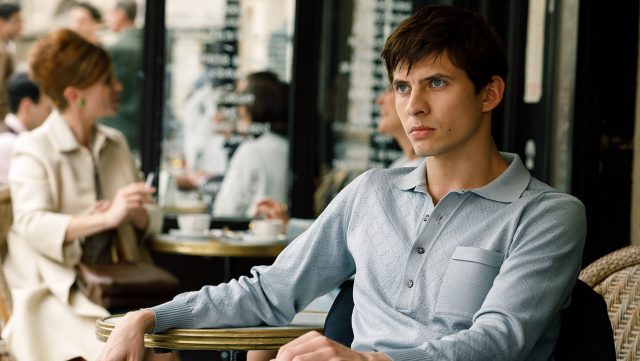The White Crow: Wayfarer, by David Bax

Oleg Ivenko is a first-time actor who was cast by director Ralph Fiennes as famed Russian ballet dancer Rudolf Nureyev more for his ability to pull off the required dance moves than for his thespian skills. This is all plain as day in The White Crow, which features dance sequences that are almost magical. Unfortunately, they are also few and far between. That’s indicative of the folly of Fiennes’ entire approach, too pigheadedly dedicated to programmatic narrative beats to stop and appreciate its own beauty or that of the graceful, exquisite Ivenko himself.
Most of Nureyev’s reputation as the greatest male dancer of his generation was built after his 1961 defection from the Soviet Union into France but The White Crow focuses on the story up to that point via two parallel narratives. One is an account of that trip to Paris, the one he took with the Mariinsky Ballet before seeking asylum at the airport on the final day. We see him meet and befriend locals, visit museums and attend cabarets and parties. In between these segments, we get chronological flashbacks to his life up to that point, from boyhood to his training under ballet instructor Alexander Pushkin (Fiennes).
Nureyev’s other reputation was that of an enfant terrible or, if you will, a total prick. Fiennes and screenwriter David Hare (adapting Julie Kavanagh’s biography Rudolf Nureyev: The Life) don’t attempt to sidestep these more unpleasant parts of their subject’s personality. But, due to Ivenko’s limits as an actor, what little we learn about his inner life and motivations comes from other characters telling him what he’s like or through metaphors like a preoccupation with model trains that helps frame his childish tantrums. Still, there is at least one question left up to the audience to decide. Namely, to what extent does Nureyev keep dancing because his talents allow him to get away with being an asshole?
Nureyev’s talents also brought him to Paris where, before defecting, he woke up early every morning to take in great works of art and architecture. Fiennes shows us this to let us know that, beneath Nureyev’s thorny exterior lies a soul that loves and appreciates beauty. Ironically, The White Crow doesn’t seems to share its subject’s reverence. Why depend on the face of a neophyte actor to emit awe when the camera could simply gaze at these works themselves and let us feel what Nureyev is feeling? Once again, Fiennes is too ordered a filmmaker to break from superficial, conventional aesthetic touches like desaturated flashbacks or J cuts.
Fiennes’ tendency toward the schematic actually pays off in the film’s final and best act, when it most comes to resemble a type of genre flick, in this case a thriller. Nureyev’s actual defection is impeccably staged, framed and timed. The breathless yet elongated suspense of this sequence contains some of the only notes of true emotion in the movie. We feel and understand the stakes and how much hangs in the balance, how much Nureyev stands to gain and lose on either side of the equation.
The flushed urgency of that situation makes subtext temporarily inconsequential, which is good for once because there isn’t any in the entirety of the film. With its stock, middlebrow visual language and its literal-minded comparisons of perfect ballet technique to Russia and the deeper, more artful properties of dance to the West, The White Crow never dares to be about anything more than what it’s about.



























